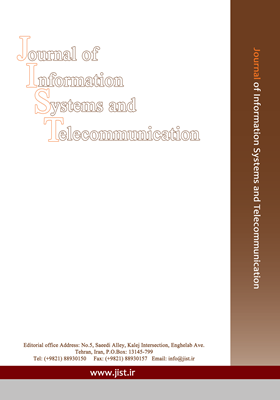AI based Computational Trust Model for Intelligent Virtual Assistant
Subject Areas : Machine learning
Babu Kumar
1
*
,
Ajay Vikram Singh
2
![]() ,
Parul Agarwal
3
,
Parul Agarwal
3
1 - Amity university
2 - Amity university
3 - Jamia Hamdard University
Keywords: Artificial Intelligence, , Virtual Assistant System, , Product Quality, , Trust, , Privacy, , Security, , Voice Recognition, , Naïve Byes Classifier,
Abstract :
The Intelligent virtual assistant (IVA) also called AI assistant or digital assistant is software developed as a product by organizations like Google, Apple, Microsoft and Amazon. Virtual assistant based on Artificial Intelligence which works and processes on natural language commands given by humans. It helps the user to work more efficiently and also saves time. It is human friendly as it works on natural language commands given by humans. Voice-controlled Intelligent Virtual Assistants (IVAs) have seen gigantic development as of late on cell phones and as independent gadgets in individuals’ homes. The intelligent virtual assistant is very useful for illiterate and visually impaired people around the world. While research has analyzed the expected advantages and downsides of these gadgets for IVA clients, barely any investigations have exactly assessed the need of security and trust as a singular choice to use IVAs. In this proposed work, different IPA users and non-users (N=1000) are surveyed to understand and analyze the barriers and motivations to adopting IPAs and how users are concerned about data privacy and trust with respect to organizational compliances and social contract related to IPA data and how these concerns have affected the acceptance and use of IPAs. We have used Naïve Byes Classifier to compute trust in IVA devices and further evaluate probability of using different trusted IVA devices.
[1] J. Caminha, A. Perkusich, and M. Perkusich, “A smart trust management method to detect on-off attacks in the internet of things,” Security Commun. Netw., vol. 2018, pp. 1–10, Apr. 2018.
[2] A.V. Singh, V. Juyal and R.Saggar, "Trust based Intelligent Routing Algorithm for Delay Tolerant Network using Artificial Neural Network" in Wireless Networks (WINE), US:Springer Publication, vol. 22, no. 135, pp. 1-10, Jan. 2016.
[3] G. D’Angelo, S. Rampone and F. Palmieri, "An Artificial Intelligence based Trust Model for Pervasive Computing", Proceedings on 10th International Conference on P2P Parallel Grid Cloud and Internet Computing 3PGCIC 2015 art. no. 7424653, pp. 701-706, 2015.
[4] K. Siau and W. Wang, Building Trust in Artificial Intelligence, Machine Learning, and Robotics, Cutter Business Technology Journal, Vol. 31, No. 2, pp. 47-53, 2018.
[5] I.-R. Chen, F. Bao and J. Guo, "Trust-based service management for social Internet of Things systems", IEEE Trans. Depend. Secure Comput., vol. 13, no. 6, pp. 684-696, Nov./Dec. 2016.
[6] S. M. Sony and S. B. Sasi, "On-Off attack management based on trust", In 2016 Online International Conference on Green Engineering and Technologies (IC-GET), pp. 1-4, November, 2016.
[7] F. Jiang et al., "Deep learning based multi-channel intelligent attack detection for data security", IEEE Trans. Sustain. Comput., [online] Available: https://ieeexplore.ieee.org/document/8259310/.
[8] J. Jiang, G. Han, C. Zhu, S. Chan and J. J. P. C. Rodrigues, "A trust cloud model for underwater wireless sensor networks", IEEE Commun. Mag., vol. 55, no. 3, pp. 110-116, Mar. 2017.
[9] Kot, Mateusz Tomasz, and Grzegorz Leszczyński. "The concept of intelligent agent in business interactions: is virtual assistant an actor or a boundary object?." Journal of Business & Industrial Marketing (2020).
[10] F. Fei, S. Li, H. Dai, C. Hu and W. Dou, "A K-anonymity based schema for location privacy preservation", IEEE Trans. Sustainable Comput.2017.
[11] S. Talari et al., "A review of smart cities based on the Internet of Things concept", Energies, vol. 10, no. 4, pp. 421, 2017.
[12] F. Boustanifar and Z. Movahedi, "A trust-based offloading for mobile M2M communications", Proc. Int. IEEE Conf. Ubiquitous Intell. Comput., pp. 1139-1143, 2016.
[13] Gartner Says Worldwide Spending on VPA-Enabled Wireless Speakers Will Top \$2 Billion by 2020, Gartner, Oct. 2016, [online] Available: www.gartner.com/newsroom/id/3464317.
[14] A. Liptak, Amazon's Alexa Started Ordering People Dollhouses after Hearing Its Name on TV, The Verge, Jan. 2017, [online] Available: www.theverge.com/2017/1/7/14200210/amazon-alexa-tech-news-anchor-order-dollhouse.
[15] K. York, Dyn Statement on 10/21/2016 DDoS Attack, [online] Available: dyn.com/blog/dyn-statement-on-10212016-ddos-attack, Oct. 2016.
[16] Yuting Liao, Jessica Vitak, Priya Kumar, Michael Zimmer, and Katherine Kritikos. Understanding the Role of Privacy and Trust in Intelligent Personal Assistant Adoption. In Information in Contemporary Society, Natalie Greene Taylor, Caitlin Christian-Lamb, Michelle H. Martin and Bonnie Nardi (eds.). Springer International Publishing, Cham, 102--113. https://doi.org/10.1007/978--3-030--15742--5_9, 2019.
[17] Chung, Hyunji, Michaela Iorga, Jeffrey Voas, and Sangjin Lee. Alexa, Can I Trust You? Computer 50: 100, 2017.
[18] A. S. Tulshan and S. N. Dhage, "Survey on virtual assistant: Google assistant Siri Cortana Alexa", Proc. Int. Symp. Signal Process. Intell. Recognit. Syst., pp. 190-201, 2018.
[19] Kshama V. Kulhalli, “Personal Assistant with Voice Recognition Intelligence”, ISSN 0974-3154 Volume 10, Number 1, 2017.
[20] Amanda Purington, Jessie G. Taft, Shruti Sannon, Natalya N. Bazarova, and Samuel Hardman Taylor. 2017. "Alexa is my new BFF": Social Roles, User Satisfaction, and Personification of the Amazon Echo. In Proceedings of the CHI Conference Extended Abstracts on Human Factors in Computing Systems (CHI EA '17). ACM, New York, NY, USA, 2853—2859, 2017.
[21] V. Këpuska and G. Bohouta, “Next-Generation of Virtual Personal Assistants (Microsoft Cortana, Apple Siri, Amazon Alexa and Google Home),” in 2018 IEEE 8th Annual Computing and Communication Workshop and Conference (CCWC), pp. 99–103, 2018.
[22] J. R. Bellegarda, "Spoken language understanding for natural interaction: The Siri experience" in Natural Interaction with Robots Knowbots and Smartphones, New York:Springer-Verlag, pp. 3-14, 2014.
[23] Kunal Gupta, Ryo Hajika, Yun Suen Pai, Andreas Duenser, Martin Lochner, and Mark Billinghurst. "Measuring Human Trust in a Virtual Assistant using Physiological Sensing in Virtual Reality." In 2020 IEEE Conference on Virtual Reality and 3D User Interfaces (VR), pp. 756-765. IEEE, 2020.

